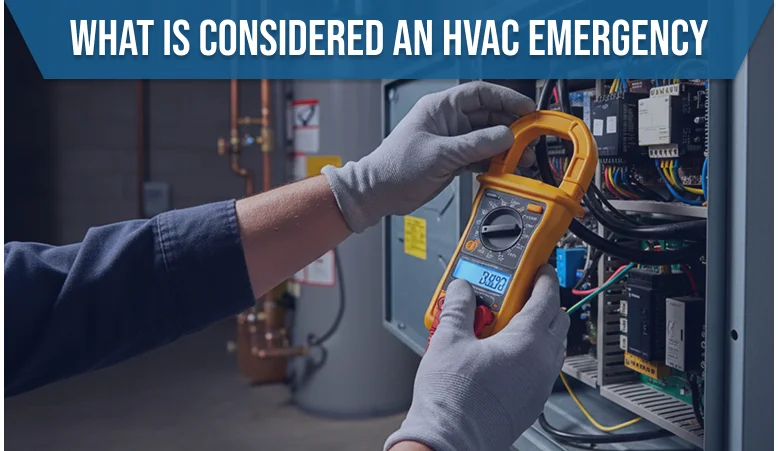Contact Info

When it comes to the comfort of businesses or homes in Pennsylvania, HVAC systems are essential components. Sudden and unexpected HVAC breakdowns can become frustrating when you don’t know how to tackle them. Especially during the peak days of freezing winter and humid summers, such scenarios are something more than just an inconvenience. In this guide, we will explore the common HVAC issues that qualify to be considered as an emergency and must be addressed urgently. Moreover, we will also cover some essential maintenance steps and key takeaways to minimize the risk of such situations in the future.
An HVAC emergency is any HVAC problem that jeopardizes the health, safety, or comfort of the residents. Unlike standard services, HVAC emergencies need urgent assistance to address the issue and bring it back to regular operation.
In Pennsylvania, HVAC emergencies are much more common as compared to other areas because of extreme temperature fluctuations. From -10°F in northern Pennsylvania during winter to 95°F in summer in southeast areas like Philadelphia, the climate puts an undue strain on both heating and cooling appliances. Let’s explore some of the common emergency scenarios in this regard.
Extreme chills in Lehigh Valley and Allentown, PA, put an extra burden on heating equipment. As a result temperature drops to extremely low levels. It causes significant issues like frozen pipes, component failure, wear and tear, and other plumbing issues. All this creates an urgent need for commercial or residential heating repair in PA.
Here are some of the heating emergencies often seen across Pennsylvania;
Furnace Problems: Furnace not working, blocked vents, carbon monoxide release, and fire hazards, etc.
Heat Pump Problems: Blocked filters, thermostat malfunctions, electrical issues, mechanical failures, etc.
Boiler Problems: Reduced boiler pressure, water leaks, no warm water, frequent short cycling, and safety hazards etc.
Summers in Pennsylvania bring intense heat waves and high levels of humidity. This harsh duo makes the cooling appliances work longer and harder to achieve the desired cooling effect. High moisture in the Lehigh Valley and eastern PA makes even slight temperature increases feel more severe.
Here are some of the common cooling emergencies in PA;
Air Conditioning Failure: When the AC stops working, indoor temperatures increase exponentially. In a few hours, the temperature crosses bearable limits.
Sudden Refrigerant Leaks: When there is a sudden and significant coolant leakage, an AC loses its cooling power immediately.
Frozen Evaporator Coil: A Frozen indoor coil of an air conditioner blocks airflow. It contributes to the loss of AC's cooling capacity.
Urgent repairs are essential for every HVAC emergency in Pennsylvania. This is not just because of financial reasons, it is also because it can prevent you from serious health and safety risks. That’s why it is always recommended to book professional HVAC service in PA immediately as you notice any issues with your HVAC equipment.
Here is what can happen if you ignore timely repairs;
"According to the U.S. Centers for Disease Control and Prevention (CDC), unintentional carbon monoxide (CO) poisoning, which is often caused by issues with fuel-burning appliances like furnaces, sends over 100,000 Americans to emergency departments each year."
When there is an HVAC emergency, act fast to save your loved ones and property. If you fail to do so, you may have to face serious consequences. The team at Lehigh HVAC recommends taking the following steps to prevent significant damage;
Preventive measures are the key to preventing unexpected breakdowns. Here is what you can do to avoid such stressful situations;
Lehigh HVAC provides emergency services in various regions across Pennsylvania. Our NATE-certified technicians are available 24/7 to assist you in emergencies. Whether your furnace stops working in January or your AC stops cooling in July, we can arrive quickly. We cover both residential and commercial HVAC services in PA. We also offer GreenSky 0% financing options to ease your payments.
HVAC emergencies are unexpected and can arise anywhere. A proper knowledge of alarming signs is essential to prevent serious consequences. Taking immediate safety measures and calling a professional is also key to minimizing the risks. In Pennsylvania, when you need urgent, on-site assistance, call Lehigh HVAC at 484-961-7044.